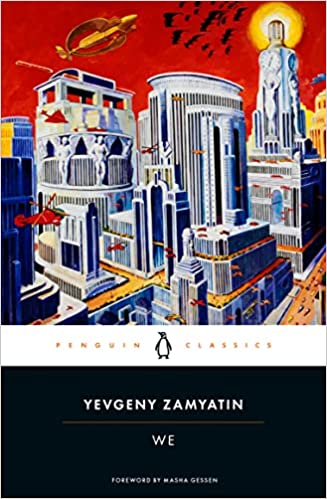I am pretty well up on the 19th century Russian novelists, so when I was making my Classics Club list, I asked my husband to recommend someone more recent. He mentioned We.
The introduction calls Zamyatin an inconvenient citizen of both the czarist and Communist regimes, because he believed in complete freedom for the individual. His novel We is the granddaddy of dystopian novels and an inspiration to Orwell.
D-50 is a good citizen of the OneWorld, where everyone eats, sleeps, and works in unison. He is also the creator of INTEGRAL, which is going to be shot off into space to make the entire universe uniformly happy. He is writing a record to explain to the citizens of the universe why they should want to be uniform.
He thinks he is happy with O-90, whom he periodically requests for sex (the one time when they’re allowed to close the blinds of their glass apartments) until he meets I-330. There’s something mocking about her, and he thinks she’s up to something. Then she begins dragging him into situations that he should report her for to the Guardians. But he doesn’t, and soon he is madly in love with her and behaving strangely.
This novel is both dystopian fiction and a satire of some of the beliefs of Communism. At times, it is quite fevered in tone, and I wasn’t always sure what was going on. Characterization doesn’t even make sense in such a novel, so Zamyatin picks out weird facial features to identify people. Not my genre, but interesting.


I read this one a few years ago and enjoyed it, but more for seeing the influence it had on people like Orwell and Huxley than for its own merits.
I can understand that!
Happy New Year!
After I read your review of We, I ran across the link to your review of Stranger in a Strange Land (November 2012). I just had to read it, because that book-and Heinlein-were SO popular in the 1960s and 1970s.
That was the book that ended my reading relationship with Heinlein, and for every reason that you mention. His writing is pedestrian and pedantic, and his treatment of women-throughout all his novels-is just very condescending and patriarchal. I began reading the women who were writing science fiction-and their writing was better, their stories were better, and their characters were strong and believable.
Our book club is revisiting Ray Bradbury this month, and I’m finding that he, too, doesn’t wear well. Reread The Illustrated Man
And the only story that still resonates with me is The Veldt. As with Heinlein, not only does Bradbury not really know the science of his era, he really uses his stories to rail against what he sees as the takeover of our lives by technology, and the hopelessness of the human condition now that the atom bomb has been developed and dropped.
Just wanted to let you know that you weren’t the only person in the universe that didn’t/doesn’t revere Heinlein!
Back to Thirkell. . .
Sue
I agree with your comments about Bradbury, too. In the 60’s-70’s, sci-fi was definitely a man’s world. I turned to Ursula Le Guin and Anne McCaffrey and one other woman writer whose name I can’t think of right now.
Maybe Andre Norton? She was strictly sci-fi in the â50s.
Other women writers I enjoy(ed) were Barbra Hambly, Marian Zimmer Bradley, Madelein LâEngle, Jennifer Roberson, Nancy Springer, Judith Tarr, and Jane Yolen. The last four, however, may be considered fantasy writers rather than science fiction.
Good reading times. . .itâs not as hard to find good writers these days as it is to find good stories. . .do you know what I mean?
No, it was Marian Zimmer Bradley, definitely fantasy.
This isn’t really my genre either, but it does sound interesting!
As FictionFan commented, maybe more for seeing its influence on Huxley and Orwell.
This was one of my favorites during my year of dystopic readings. Loved it!
Sounds interesting, I am not familiar with the author. However, always nice to find a new Russian author.
Yes.